Feeding treats is a great way to add variety to your parrot’s daily diet, show your affection, and care for them. Parrot owners have a wide range of options when it comes to selecting treats, from seed mixes to cooked morsels, fruits, and vegetables. Not only do these treats add flavour and nutrition to the parrot’s diet, but they also provide variety. While monitoring the amount of treats is important for the parrot, a small treat in different meals can have a positive impact on improving its health.
Seeds and Nuts
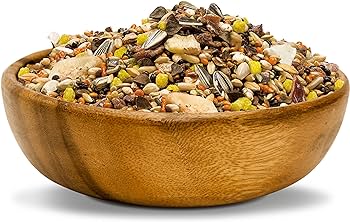
In pet stores, you can find a variety of treats for your parrot, mainly consisting of seeds and nuts. These treats often include safflower seeds and sunflower seeds, which are high in fat content and enjoyed by parrots. However, caution is necessary due to the high fat content, as excessive consumption can lead to obesity and other negative health effects in your parrot.
Seed Treats
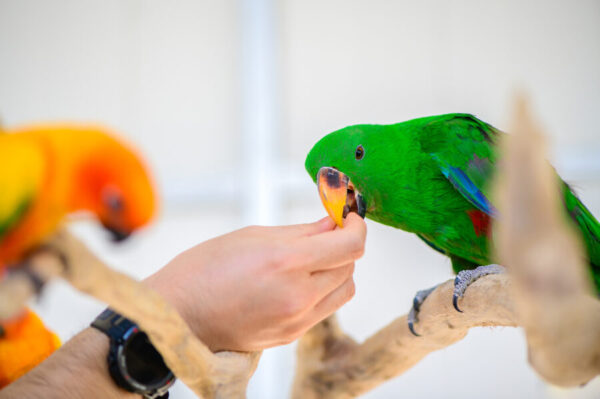
Many parrots love seed treats, which can also be seen as both a reward and a form of entertainment. When your parrot enjoys these tasty treats, it hangs itself on a perch and happily nibbles away. Most seed treats provide a wide variety of seeds to ensure the nutritional diversity of your parrot.
Cooked Treats
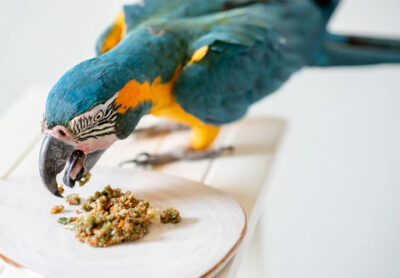
Another way to add variety to your parrot’s daily diet is by using a delightful selection of treats that are both enjoyable and nutritious. Combinations that include rice, pasta, chestnuts, walnuts, and appealing tropical fruit flavours provide healthy treats with a sensory experience of colours, textures, and flavours for all types of parrots. Preparing these treats is simple – just add water to the mix, let it cool, and then offer it to them!
Fruits and Vegetables
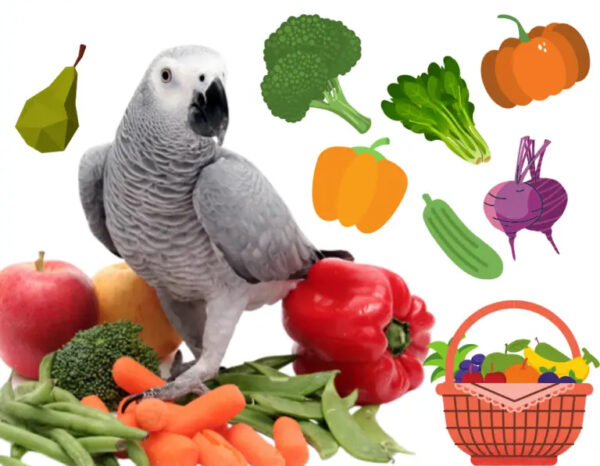
Fruits and vegetables are another category of treats that are both nutritious and flavourful, readily available to parrot owners. Fresh or dried fruits can add a touch of freshness to your parrot’s diet, while some species enjoy carrots and bell peppers as they provide essential vitamins and minerals. For example, carrots can contribute to your parrot’s eye health, and overall crunchy treats can be effective in strengthening its beak and jaw. Your parrot can try any type of vegetable or fruit except for avocado. When fruits or vegetables turn brown, you should remove fresh items to prevent them from spoiling.
Since these types of treats are an enjoyable addition to a parrot’s diet, they should not make up more than 10% of their daily food intake. A diet primarily composed of treats disrupts the balance of nutrients and can cause health problems. However, when consumed in conjunction with a balanced diet, these treats can be a suitable way to keep your parrot happy and healthy.
introducing new foods to specific pet birds
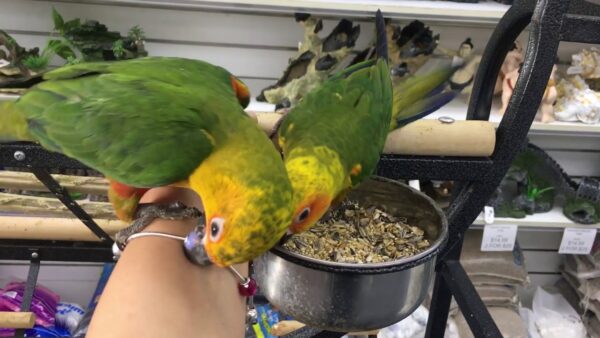
Creating diversity in a parrot’s diet is crucial, but when it comes to introducing new foods, parrots can sometimes be resistant, much like stubborn children. It’s best to start introducing a variety of foods to your parrot, just as you would with children, from an early age. The morning, when it’s an optimal time for feeding the parrot, can be the best time to try new foods. Incorporate the new foods into your parrot’s daily diet to encourage them to try it, or prepare a separate dish with a few pieces of their favourite treats. This will help the parrot discover the new food and, hopefully, taste it with enthusiasm.
Offer the fresh foods fresh or cooked, warm or cold, etc. Your bird may prefer one method over another. If your bird doesn’t eat the new foods from a dish, try hanging or attaching pieces or leaves within the cage to encourage them to chew and explore. Birds are attracted to vibrant colours, so try incorporating fresh and vibrant foods to entice your bird to investigate them.
During “family dinner” time, your parrot may be interested in trying new things. If the parrot sees everyone enjoying macaroni, grains, or vegetables and they all seem to be enjoying it, they might want to give it a try! So be patient, try several things, and it doesn’t matter what, but always provide your parrot with a variety of healthy foods and treats.
The importance of dietary differences among various types of parrots
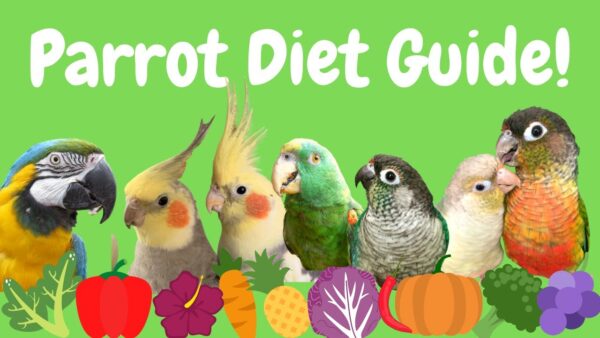
A balanced and nutritious diet is key to helping your parrot live a long and healthy life. In fact, an ideal parrot diet consists mainly of food grains. You should discuss your parrot’s needs with a veterinarian to ensure the appropriate treatment plan for their health and well-being.
When it comes to different types of parrot diets, there are five main categories with their own nutritional recommendations:
1. Granivorous: The primary diet consists of grains and seeds.
2. Frugivorous: The primary diet consists of fruits and flowers, along with some supplements like cottonseeds and seeds.
3. Florivorous: The primary diet consists of seeds, fruits, flowers, husks, roots, and berries.
4. Omnivorous: The primary diet consists of seeds, fruits, insects, and boneless creatures.
5. Nectarivorous: The primary diet consists of nectar, flower pollen, some insects, and seeds.
Since parrots have access to a wide variety of foods in nature, it’s important to replicate these combinations for each parrot. Fortunately, there are many well-formulated diet options available today. These excellent food options often come in the form of pellets, crumbles, pieces, and cakes, constituting approximately 65% to 80% of your parrot’s diet.
Fruits and Vegetables
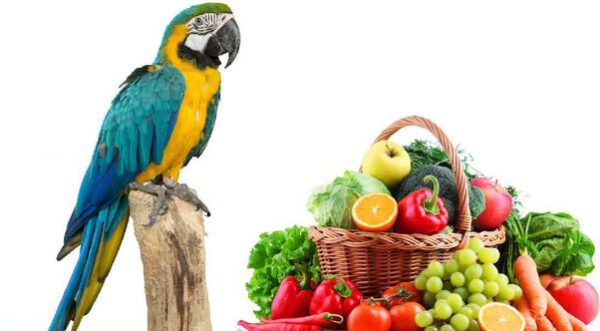
As important snacks to reinforce your parrot’s dietary habits and keep them engaged, there is a variety of fresh fruits and vegetables that you can incorporate into your parrot’s daily life. You should allocate about 15% to 30% of your parrot’s daily diet to vegetables and another 5% for fruits as a source of vitamins and minerals. To prevent health issues, always thoroughly wash all fruits and vegetables and remove any pits or seeds before providing them to your parrot. Some suitable vegetable options include carrots, turnips, cabbage, tomatoes, lettuce, rice, and cucumbers. For fruits, consider interesting options such as peaches, pears, cherries, berries, apples, kiwis, and mangoes to provide new and exciting flavours for your parrot.
Food to Avoid
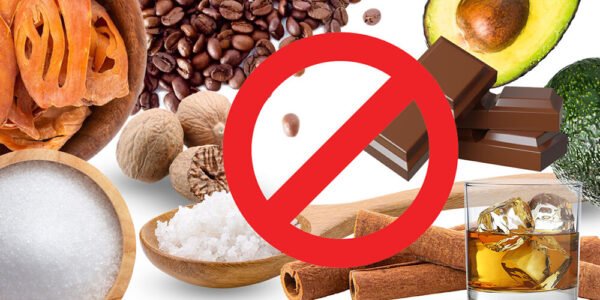
Just like with other domesticated animals, there are several types of food that are best avoided when feeding your parrot, as they may have adverse effects on their health. The “prohibited list” includes items such as fatty and high-calorie foods, chocolate, alcohol, regular table salt, avocado, fruit seeds or pits, onions, and mushrooms. If you’re unsure about something you want to give to your parrot, inquire and consult with a veterinarian to ensure your parrot’s health is not compromised.
Vitamin Deficiencies in Exotic and parrots
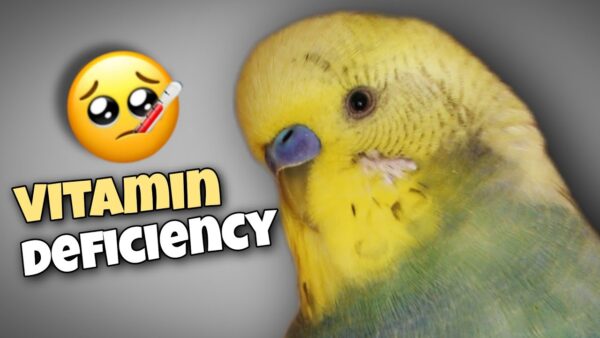
There are various opinions regarding the nutrition of pet and non-native birds and what constitutes a healthy diet for them. Some experts recommend seeds supplemented with fresh fruits and vegetables, while others add pellets to this combination, and some only recommend pellets. This can confuse parrot owners.
Research on bird nutrition is an ongoing process, and although the bird food industry has played a significant role in developing essential nutritional guidelines, new discoveries are still being made. One fact that most experts agree on is that a diet consisting solely of seeds, especially sunflower seeds and peanuts that many birds prefer, is not nutritionally complete and can lead to vitamin deficiencies. Vitamin A deficiency is common in parrots and often goes unnoticed.
To prevent vitamin deficiencies, it is necessary to use a type of feed that includes a balanced pellet diet, supplement seeds with fruits and vegetables rich in vitamins, or add vitamin and mineral supplements to the parrot’s diet. Some supplements are designed to be added to water containers, while others come in powdered form and can be sprinkled on lightweight and fresh foods.
Fresh fruits and vegetables that are rich in vitamins include dark leafy greens such as kale, which contains vitamin A and calcium. Cauliflower leaves contain vitamins A, K, B2, and C, and parrots often enjoy eating both the florets and the stems. Sweet potatoes are an excellent source of vitamins A, C, calcium, and potassium. Parrots love mashed sweet potatoes, and it is a good practice to introduce this healthy food to them from a young age.
10 Foods to Avoid Feeding to Parrots
- vocado
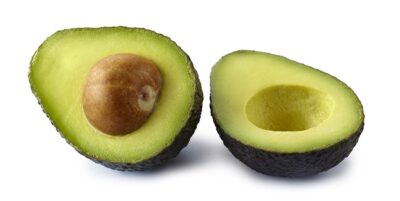 Avocado contains persin, which is not good news for parrots. This fruit contains unhealthy fats and can cause serious cardiac toxicity, especially in smaller parrot species. A piece of carrot is a suitable alternative.
Avocado contains persin, which is not good news for parrots. This fruit contains unhealthy fats and can cause serious cardiac toxicity, especially in smaller parrot species. A piece of carrot is a suitable alternative. - Coffee
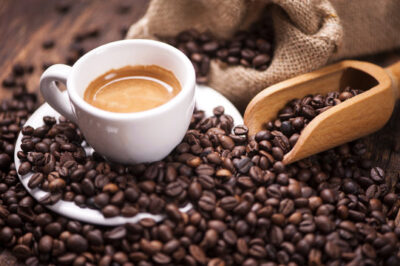
Caffeine-induced irritability is the worst kind of irritability – imagine how bad it would be for a parrot with its small heart! The consumption of any type of caffeine is not beneficial for parrots, especially the caffeine found in coffee, tea, and carbonated beverages. Fresh and cool water is a more suitable recommendation. - Chocolate
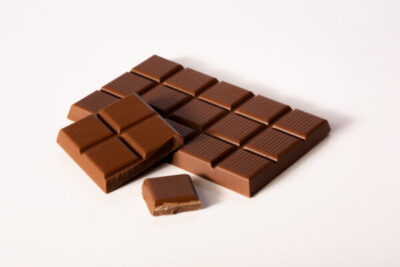
Well, almost everyone knows that chocolate should not be given to their pets! Theobromine and caffeine are toxic to parrots, and when ingested through chocolate, they can cause significant damage. A slice of banana is a better option! - Onions
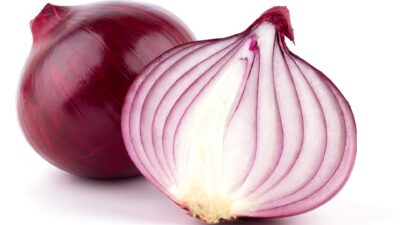
It’s best not to feed green, red, or white onions to parrots. The use of onions, whether raw or in powdered extract form, can cause serious toxicity in parrots, which can be fatal. So, it’s not necessary! A piece of mango is a more suitable choice. - Apple Seeds
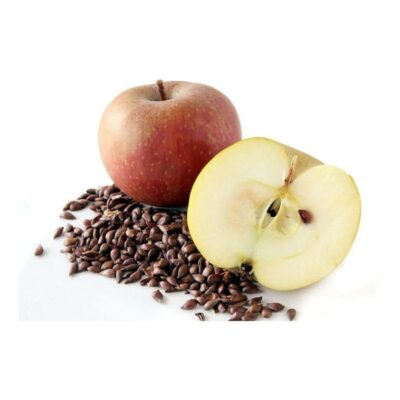
Although some parrots love apples as a treat, it’s important to remove the seeds before feeding them. Apple seeds contain cyanide, and it’s not an approved substance in our parrots’ diet. A well-washed sprout is recommended instead!
- Salty Snacks
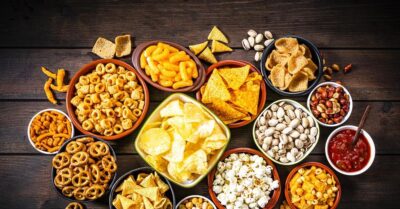
Barbecue chips don’t exist in nature, so they definitely shouldn’t be in your parrot’s digestive system. While salt is not inherently toxic to parrots, it should never be made available to them in large quantities, just like humans who consume salty snacks. Plain boiled pasta without spices is a good option! - Fatty Foods
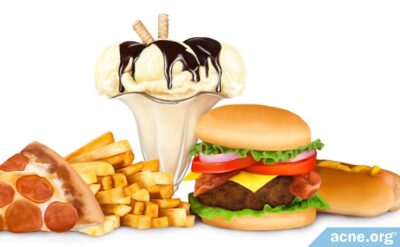 Just like salt, consuming excessive amounts of fatty foods such as eggs, sunflower seeds, and fatty nuts like cashews may not be suitable choices for parrots. Their consumption can lead to reduced activity, unhealthy weight gain, and heart problems in parrots. A better option is a few cooked beans!
Just like salt, consuming excessive amounts of fatty foods such as eggs, sunflower seeds, and fatty nuts like cashews may not be suitable choices for parrots. Their consumption can lead to reduced activity, unhealthy weight gain, and heart problems in parrots. A better option is a few cooked beans! - Fruit Seeds
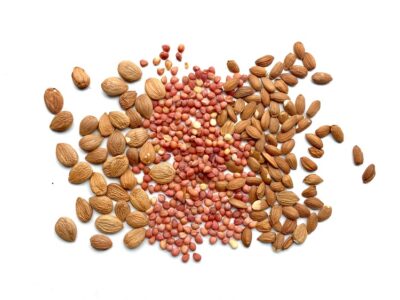 Parrots love fruits, but the seeds found in fruits such as plums, cherries, apricots, and peaches contain cyanide – always make sure to remove fruit seeds and discard them, and your parrot doesn’t have an opportunity to find a new chewing toy. It’s better to give them a piece of sweet pumpkin!
Parrots love fruits, but the seeds found in fruits such as plums, cherries, apricots, and peaches contain cyanide – always make sure to remove fruit seeds and discard them, and your parrot doesn’t have an opportunity to find a new chewing toy. It’s better to give them a piece of sweet pumpkin! - Garlic
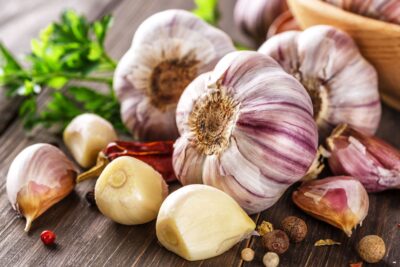 The toxicity of garlic has been well-studied in dogs and cats, and birds are no exception. Garlic, like onions, can cause serious health problems in parrots. It is recommended to give them a few unsalted pistachios!
The toxicity of garlic has been well-studied in dogs and cats, and birds are no exception. Garlic, like onions, can cause serious health problems in parrots. It is recommended to give them a few unsalted pistachios! - What Did You Have for Dinner?
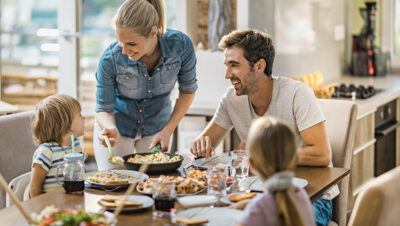
What you have just eaten is probably not a good food for your parrot. It is important never to develop a habit of feeding your bird foods that can harm their health, unless you have eaten nutritious seeds or vegetables or fruits. The diet recommended by your avian veterinarian is a better option.
